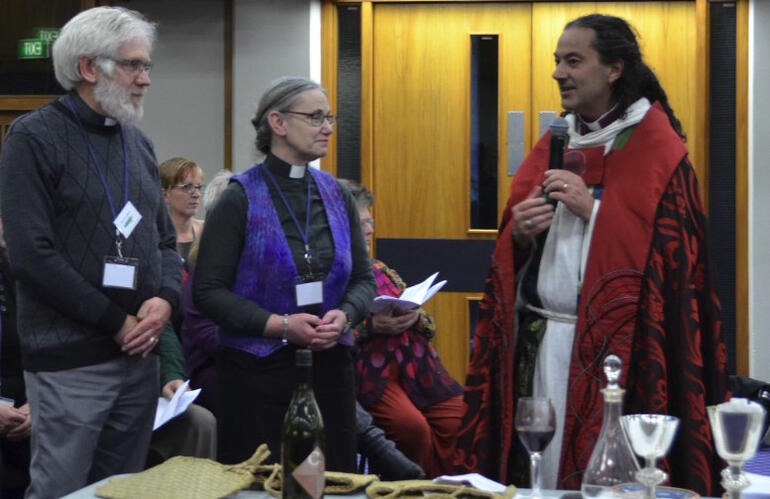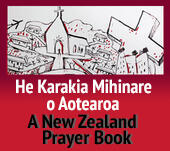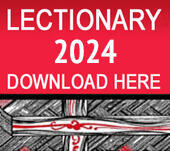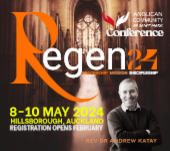
Bishop Justin Duckworth shared his dream of the diocese as a movement of disciples rather than an institution.
Illustrating his charge with diagrams on screen as he spoke, he described the diocesan family of more than 60 parishes and mission units as transformative communities held together by our covenantal bonds of baptism and ordination vows.
The synod was held in Palmerston North on September 19 and 20.
“We gather around the table and strengthen each other, we challenge and send each other out as our lives are transformed by the Holy Spirit," Bisop Justin said."We are working with God’s spirit in transforming our communities."
There were opportunities for discussion during the charge.
At the start Bishop Justin asked: “How, over the past year, have you responded to my encouragement to (re)engage with preaching the Gospel?
“You know your areas best, so go for it,” the bishop said. But just as he trusted the diocese to minister in ways appropriate to its context, he urged that members honour and trust one another to do the right thing.
“This doesn’t mean that we all agree. But because we know that each other is doing their best we can, if we need, have those difficult conversations and speak the truth to each other.”
Bishop Justin said the diocese was working towards a healthy culture and honourable relationships. He explained that a movement had a high level of trust and less rules than an institution.
When a high level of trust exists “the orders go down and the principles go up. When you don’t have trust you create bureaucracy and creative conversations become politics. A movement strengthens its covenantal bonds, one to another.”
Trustworthy disciples must ensure they attend daily to their relationship with Christ, he added.
Referring to his recent request that all parishes be prepared to host one refugee family and the related media coverage, Bishop Justin praised “a most beautiful response from us all. Together we moved with one heart, we responded with one voice, we moved together and the world took note.”
Care of creation
The theme of care of creation ran strongly through the motions at synod.
On Saturday, during a motion that commented on the diocese’s efforts to divest from Fossil Fuels, Rev Tim McKenzie (Miramar-Seatoun) reminded synod of the effects of global climate change on the beaches of Tuvalu and the glaciers of the Antarctic.
He thanked the Diocesan Board of Trustees for having divested two thirds of fossil fuel holdings and asked that the remainder be divested by the end of 2015.
In the debate that followed, Barbara Arnold (All Saints Palmerston North) asked that the Trustees look to invest in alternate energy sources, and noted that this could be a profitable change.
Rev Felicity O’Brien (Whitby) said investment policies should take account of caring for the last, the lost and the least.
On Sunday, in a motion setting next year’s diocesan priorities, Bishop Justin proposed a new diocesan priority of climate change. He told synod that the Diocese of Polynesia had come to General Synod and asked that the issue of climate change be given high priority by the province.
In presenting the motion on diocesan priorities for 2016, Bishop Justin reflected on the past year’s priorities which were biculturalism, child poverty and proclaiming the Gospel to the last, lost and least.
He was pleased with the diocesan response to biculturalism and awarded a B+ mark.
While particular parishes had made a good response to child poverty, in providing breakfasts to hungry children and promoting the Living Wage campaign, the overall diocesan response had not been particularly strong. He awarded a C+ for the response.
In 2016 the diocese will focus on Child Poverty, Climate Change and Generous Hospitality.
Bishop Justin asked that to meet the priorities this year, each parishioner take up the challenge to plant 40 trees. To reinforce this he announced that every mission unit at synod would receive a copy of Rev John Flenley’s book Trees, Trees, Trees.
In his closing remarks, Bishop Justin suggested he would like to see a self composting toilet in each parish and windmills on the top of each church.
Rev Jean Malcolm (Lower Hutt) seconded the motion remarking that the world’s poor are the first to suffer from the effects of climate change and part of the Christian calling is to care for the earth.
Te Ao Māori also calls us to care for the earth. Quoting from St Francis canticle of the creatures, she reminded us that the earth is our common home and all things in it our sisters and brothers.
Praised be You my Lord through our Sister,
Mother Earth who sustains and governs us,
producing varied fruits with coloured flowers and herbs.
The motion was passed with acclamation.

















Comments
Log in or create a user account to comment.